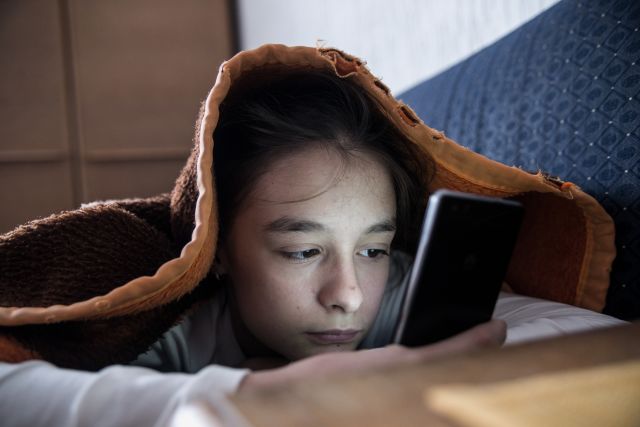Updated on August 22, 2023.
The transition from childhood to adulthood is often difficult in many ways. But today’s adolescents face a set of challenges that no generation before has likely experienced. With each passing year, a higher percentage of American teens are reported to be stressed, anxious, depressed, and suicidal.
While parents and health experts scramble to find answers to what researchers are calling a teen mental health crisis, one of the clues may be right before our eyes: Teenagers are also getting less and less sleep.
The American Academy of Sleep Medicine advises that kids aged 13 to 18 should get eight to 10 hours of sleep per day. But data from the Centers for Disease Control and Prevention (CDC) shows that in 2013, only 31.7 percent of teens reached that eight-hour mark. By 2019, that number had dropped to 22.1 percent.
As the generational sleep deficit deepens, the mental health crisis is appearing to worsen, too. In 2021, 44 percent of high school students in the United States reported having “persistent feelings of hopelessness and sadness,” continuing an upward trend from 26.1 percent in 2009 to 36.7 percent in 2019. The number of teens seriously contemplating suicide increased from 13.8 percent in 2009 to 18.8 percent in 2019, while those who attempted suicide rose from 6.3 percent to 8.9 percent.
In 2022, roughly 6,500 kids, teens, and young adults took their own lives, according to provisional data released by the Centers for Disease Control and Prevention (CDC). A separate CDC study published in June also found that the suicide rate among that age group has surged over the last two decades, rising 62 percent from 2007 to 2021.
Factors that lead to less sleep
Why are teens missing out on so much sleep?
One main reason is puberty, which brings a slew of hormonal changes to a teenager’s body. One of those is a shift in production of melatonin, the hormone that regulates sleep. Delayed release of melatonin changes a teen’s internal body clock (also known as circadian rhythm), naturally encouraging them to awaken later—and stay up later—than children or adults.
The problem is, school start times remain largely the same—or, as kids enter high school, may even shift in the direction of earlier wakeup times.
A landmark study of 10th graders whose school start time shifted from 8:25 a.m. to 7:20 a.m. found that the students were exceedingly more tired than before. By 8:30 a.m., nearly half the students were drowsy enough to fall into REM sleep within 10 to 15 minutes. It’s a timeframe so short it’s often used as a possible indicator of narcolepsy.
Not only is valuable sleep time lost to early starts, but bleary-eyed teens are expected to process early morning lessons, take tests, and maintain busy schedules throughout the school day. Adding on extracurricular activities, homework, and after-school jobs leaves even fewer hours in the day for rest and contributes to increased levels of stress.
Meanwhile, technology use keeps teens awake later and later. A 2019 study of over 2,100 high school students in Minnesota found that those who weren’t getting enough sleep were likelier to use electronic devices before bedtime and used them twice as often throughout the day.
To keep pace with heavy homework loads—and to avoid missing out on social media threads after hours—many teens use caffeinated drinks to keep them awake. Caffeine may offer an immediate benefit of alertness, but when consumed too close to bedtime, it has the effect of interfering with restful sleep, compounding the problem of sleep deprivation.
As teens lose hours of sleep throughout the school week, they accrue “sleep debt.” To combat this, many teens compensate by sleeping in on weekends. But researchers say this is not a sustainable solution. While catch-up sleep may feel helpful in the short term, varying your sleep and wake-up times can further throw your internal clock out of whack. This opens teens up to a range of negative effects, including mood issues.
Mental health effects of sleep deprivation
The consequences of long-term sleep loss are far-reaching, both in and out of the classroom. Studies show it affects neurocognitive functions, such as memory and attention, which affect the ability to learn and retain information.
“When you sleep, you consolidate and organize memories in your brain, so when you try to recall them later, it's easier,” says Eric Lewkowiez, MD, associate professor in the Department of Psychiatry and Health Behavior at the Medical College of Georgia at Augusta University. “If a young person is not getting enough sleep, they're going to fall asleep in school, and they're not going to get what they could from being there. It's almost like they're not there.”
Other research shows that sleep deprivation can put teens in physical danger. Driving while drowsy poses almost as much of a risk as driving drunk. Nearly 10 percent of car crashes are due to sleepy driving, over half of which are caused by people aged 16 to 24. Moreover, teens with insufficient sleep are more likely to engage in risk-taking behaviors, including alcohol and drug use, violent behavior, and unsafe sex.
Perhaps the most devastating effects of sleep deprivation, though, are seen on mental health. A University of Texas study of over 4,000 teens published in 2014 in Sleep found that those who were sleep deprived—getting less than six hours of sleep per night—were over four times as likely as their more-rested peers to develop major depressive disorder. Sleep loss has also been linked to a higher risk of other mood disorders like anxiety.
Poor sleep also seems to be predictive of future mood disorders. A 2020 study published in The Journal of Child Psychology and Psychiatry found that from a sample of 5,000 15-year-olds, those who reported sleeping poorly were more likely to be anxious or depressed at 17, 21, and 24 years old. Another study published in 2021 in Sleep Medicine looked at high school students in China and found that short sleep duration was linked to later symptoms of depression and anxiety. Catching up on sleep on weekends was also seen as a risk factor for depressive and anxiety symptoms.
Does sleep affect mental health or vice versa?
Although poor sleep seems to be predictive of mood disorders, sleep disturbance is also one of the most common symptoms of mood disorders.
Poor sleep and mood disorders can stem from many of the same sources, including traumatic events, chronic stress, and genetics. This can make it difficult to pinpoint how exactly someone is being affected. Problems with sleep or mental health can also exacerbate one another. You may not be sleeping well, which can worsen your mood, which further worsens your sleep, in what can become a vicious cycle.
What can be done?
While there is much more to be learned about the sleep-mental health connection, the good news is that there are potential solutions for teens.
Push school start times. A three-year study from the University of Minnesota published in 2014 followed 9,000 high school students whose start times shifted to 8:30 a.m. or later. Schools starting at 8:30 a.m. saw over 60 percent of their students achieve at least eight hours of sleep a night. Those starting at 8:35 a.m. or later saw big improvements in academics, standardized test scores, and attendance rates. (Shifting from a start time of 7:35 a.m. to 8:55 a.m. was even linked to a 70 percent reduction in car crashes involving 16- to 18-year-olds.)
Importantly, research shows that later school start times may be associated with improved mental well-being.
A 2017 follow-up study from the University of Minnesota published in Sleep Health found that every extra hour of sleep was associated with a 28 percent reduction in the chance students reported feeling unhappy, sad, or depressed. More sleep was also linked to less frequent use of alcohol, cigarettes, and other drugs.
One 2018 study published in Sleep looked at students at an all-girls’ school in Singapore. After moving the school’s start time from 7:30 a.m. to 8:15 a.m., students reported less sleepiness, better mood, and fewer symptoms of depression.
Reduce homework load. Research suggests students are often tasked with too much homework. A 2014 Stanford study found that an optimal nightly amount ranges from 90 to 120 minutes. More time spent can be counterproductive as it makes students more likely to skimp on sleep, drop other activities and hobbies, and spend less time with friends and family.
Maintain consistent bedtimes. Lewkowiez says teens are more prone than others to disturbed sleep cycles, especially during the summer. Parents can help by setting lights-out times and establishing good sleep habits.
“I try to encourage parents to try to keep a normal schedule through the year and not wait until the week of school to try and get them to adjust,” says Lewkowiez. “It takes a while to reset your internal clock.”
One 2010 study published in Sleep found that teens with bedtimes of 10 p.m. rather than midnight were 24 percent less likely to be depressed and 20 percent less likely to show suicidal ideation.
Nix devices and caffeine. Teenagers should avoid late-night use of electronic devices, which has been linked to greater odds of inadequate sleep, lower sleep quality, and daytime drowsiness. Exposure to the blue light generated by electronic devices during night hours can disrupt circadian rhythms. Teens—and adults—should stop consuming caffeine at least six hours before bedtime.
If sleep issues persist after trying at-home solutions, reach out to a healthcare provider (HCP) to see if there may be an underlying health issue at play, such as sleep apnea. If symptoms of depression or anxiety are ongoing, it’s important to consult with a mental health professional. If your teen experiences thoughts of self-harm or suicide, call the National Suicide Prevention Lifeline at 1-800-273-8255 or call, text, or chat to 988.







